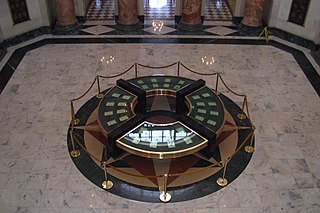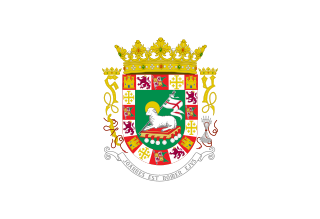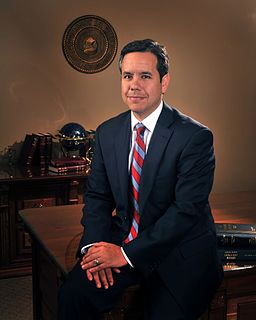
The government of Puerto Rico is a republican form of government with separation of powers, subject to the jurisdiction and sovereignty of the United States. Article I of the Constitution of Puerto Rico defines the government and its political power and authority pursuant to U.S. Pub.L. 82–447. Said law mandated the establishment of a local constitution due to Puerto Rico's political status as a commonwealth of the United States. Ultimately, the powers of the government of Puerto Rico are all delegated by Congress and lack full protection under the U.S. Constitution. Because of this, the head of state of Puerto Rico is the President of the United States.

The federal government of the United States is the national government of the United States, a federal republic in North America, composed of 50 states, a federal district, five major self-governing territories and several island possessions. The federal government is composed of three distinct branches: legislative, executive, and judicial, whose powers are vested by the U.S. Constitution in the Congress, the president and the federal courts, respectively. The powers and duties of these branches are further defined by acts of Congress, including the creation of executive departments and courts inferior to the Supreme Court.

The Constitution of the Commonwealth of Puerto Rico is the controlling government document of Puerto Rico. It is composed of nine articles detailing the structure of the government as well as the function of several of its institutions. The document also contains an extensive and specific bill of rights. It was ratified by Puerto Rico's electorate in a referendum on March 3, 1952, and on July 25, 1952, Governor Luis Muñoz Marín proclaimed that the constitution was in effect. July 25 is known as Constitution Day.

The Governor of Puerto Rico is the highest executive authority of the Commonwealth of Puerto Rico, its head of state, head of government, and commander-in-chief of the Puerto Rico National Guard.

The Supreme Court of Puerto Rico is the highest court of Puerto Rico, having judicial authority to interpret and decide questions of Puerto Rican law. The Court is analogous to one of the state supreme courts of the states of the United States and is the highest state court and the court of last resort in Puerto Rico. Article V of the Constitution of Puerto Rico vests the judicial power in the Supreme Court, which by nature forms the judicial branch of the government of Puerto Rico. The Supreme Court holds its sessions in San Juan.

Secretary of state is an official in the state governments of 47 of the 50 states of the United States, as well as Puerto Rico and other U.S. possessions. In Massachusetts, Pennsylvania, and Virginia, this official is called the secretary of the commonwealth. In states that have one, the secretary of state is the chief clerk of the state and is often the primary custodian of important state records. In the states of Alaska, Hawaii, and Utah, there is no secretary of state; in those states many duties that a secretary of state might normally execute fall within the domain of the lieutenant governor. Like the lieutenant governor, in most states, the secretary of state is in the line of succession to succeed the governor, in most cases immediately behind the lieutenant governor. In three states with no lieutenant governor as well as the U.S. territory of Puerto Rico, the secretary of state is first in the line of succession in the event of a gubernatorial vacancy.

The Government of Khyber Pakhtunkhwa, , is the provincial government of the province of Khyber Pakhtunkhwa, Pakistan. Its powers and structure are set out in the provisions of the 1973 Constitution, in which 32 districts come under its authority and jurisdiction. The government includes the cabinet, selected from members the Khyber Pakhtunkhwa Assembly, and the non-political civil staff within each department. The province is governed by a unicameral legislature with the head of government known as the Chief Minister. The Chief Minister, invariably the leader of a political party represented in the Assembly, selects members of the Cabinet. The Chief Minister and Cabinet are thus responsible the functioning of government and are entitled to remain in office so long as it maintains the confidence of the elected Assembly. The head of state of the province is known as the Governor, while the administrative boss of the province is Chief Secretary Khyber Pakhtunkhwa.
The Oklahoma Commissioner of Labor is an elective executive officer of the State of Oklahoma. The Labor Commissioner serves as the head of the Oklahoma Department of Labor. The Labor Commissioner is responsible for supervising the administration of all state laws relating to labor and workplace safety and gathers and publishes information about the workforce of Oklahoma.
The government of Virginia combines the Executive, Legislative and Judicial branches of authority in the Commonwealth of Virginia. The current Governor of Virginia is Ralph Northam. The State Capitol building in Richmond was designed by Thomas Jefferson, and the cornerstone was laid by Governor Patrick Henry in 1785. Virginia currently functions under the 1971 Constitution of Virginia. It is the Commonwealth's seventh constitution. Under the Constitution, the government is composed of three branches, the legislative, the executive and the judicial.
The president of the Senate of Puerto Rico is the highest-ranking officer and the presiding officer of the Senate of Puerto Rico. The president has voting powers as it is elected amongst the own members of the Senate as established by Article III of the Constitution of Puerto Rico. The Constitution, however, does not establish its functions and since the Senate is the only body authorized by the Constitution to regulate its own internal affairs, the functions of the president vary from session to session—save being called "President" as the Constitution establishes. The president is typically elected during the Senate's inaugural session.

The secretary of state of Puerto Rico leads all efforts that promote the cultural, political, and economical relations between Puerto Rico and foreign countries, and other jurisdictions of the United States. The post was created by Article IV of the Constitution of Puerto Rico which merely establishes that the secretary serves as acting governor when the governor is unable to perform his duties—a post similar to that of a lieutenant governor in U.S. politics. In recent times, however, the post has evolved into one similar to that of a foreign minister. Today, the secretary is the officer in charge of Puerto Rico's foreign relations, albeit under the consent of Congress or the U.S. Department of State due to Puerto Rico's political status.

The Lieutenant Governor is an official in state governments of 45 out of 50 United States. In most cases, the lieutenant governor is the highest officer of state after the governor, standing in for that officer when they are absent from the state or temporarily incapacitated. In the event a governor dies, resigns or is removed from office, the lieutenant governor typically becomes governor.

Miguel Alberto Romero Lugo is a Puerto Rican lawyer, who is the current Mayor of San Juan, Puerto Rico. He was also Secretary of Labor and Human Resources of Puerto Rico and former Chief of Staff of Puerto Rico during Governor Luis Fortuño's administration (2012-2013)

The Puerto Rico Public–Private Partnerships Authority (P3A) is a government-owned corporation of Puerto Rico created in order to regulate public–private partnerships in Puerto Rico. Its organic law was enacted by the 15th Legislative Assembly and signed into law by Governor Luis Fortuño.

The Popular Democratic Party is a political party in Puerto Rico that advocates to continue as a Commonwealth of the United States with self-government. The party was founded in 1938 by dissidents from the Puerto Rican Liberal Party and the Unionist Party and originally promoted policies on the center-left. In recent years, however, its leaders have described the party as centrist.
The Chief of Staff of Puerto Rico is the highest-ranking officer in the executive branch of the government of Puerto Rico after the governor and the secretary of state. The Chief of Staff leads the Secretariat of Governance and is charged with managing and overseeing almost all executive agencies while assisting and advising the governor.

The executive branch of the government of Puerto Rico is responsible for executing the laws of Puerto Rico, as well as causing them to be executed. Article IV of the Constitution of Puerto Rico vests the executive power on the Governor—whom by its nature forms the executive branch.

The Office of the Governor of Puerto Rico —commonly called La Fortaleza — consists of the immediate staff of the Governor of Puerto Rico, as well as multiple levels of support staff reporting to the Governor. The Office is headed by the Governor and its headquarters are located at La Fortaleza. The Office used to be called the Office of Puerto Rico.
The Office of the Chief of Staff of the Governor of Puerto Rico is the umbrella organization and government agency of the executive branch of the government of Puerto Rico that manages and oversees all the executive departments of the government of Puerto Rico and almost all executive agencies. The Office is headed by the Puerto Rico Chief of Staff and is composed by the Governor's Advisory Board and all other staff appointed by the chief of staff. The Office of the Chief of Staff is ascribed to the Office of the Governor.












